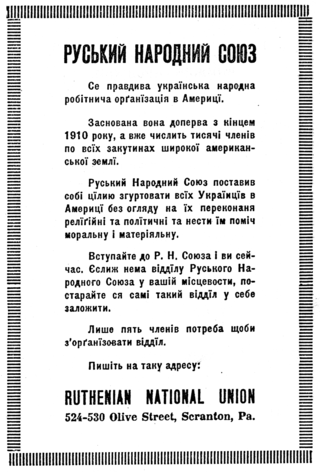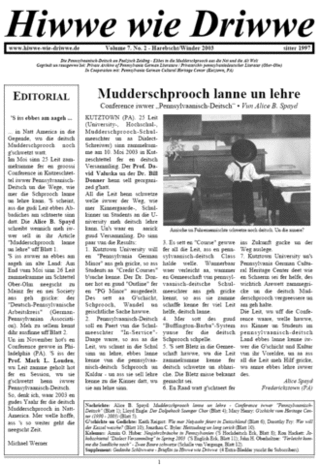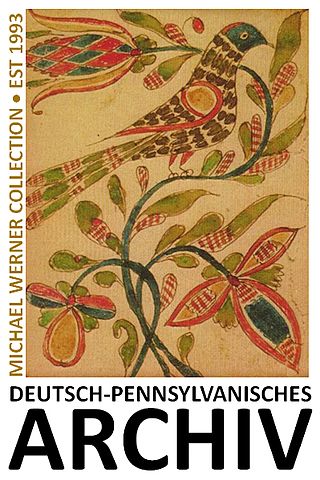
The Palatinate, or the Rhenish Palatinate (Rheinpfalz), is a historical region of Germany. The Palatinate occupies most of the southern quarter of the German federal state of Rhineland-Palatinate (Rheinland-Pfalz), covering an area of 2,105 square miles (5,450 km2) with about 1.4 million inhabitants. Its residents are known as Palatines (Pfälzer).

The Pennsylvania Dutch, also referred to as Pennsylvania Germans, are an ethnic group in Pennsylvania (U.S.), Ontario (Canada) and other regions of the United States and Canada, most predominantly in the US Mid-Atlantic region. They largely originate from the Palatinate region of Germany, and settled in Pennsylvania during the 17th, 18th, and 19th centuries. While most were from the Palatinate region of Germany, a lesser number were from other German-speaking areas of Germany and Europe, including Baden-Württemberg, Hesse, Saxony, and Rhineland in Germany, Switzerland, and the Alsace–Lorraine region of France.

Pennsylvania Dutch or Pennsylvania German is a variety of Palatine German spoken by the Pennsylvania Dutch, including the Amish, Mennonites, Fancy Dutch, and other related groups in the United States and Canada. There are approximately 300,000 native speakers of Pennsylvania Dutch in the United States and Canada.

Over 50 million Americans claim German ancestry, which makes them the largest single claimed ancestry group in the United States. Around 1.06 million people in the United States speak the German language at home. It is the second most spoken language in North Dakota and is the third most spoken language in 16 other states.

The International Police Association (IPA) is a worldwide fraternal police organization. The IPA operates as a Non-Governmental Organization open to active duty or retired members of the police force.

German Canadians are Canadian citizens of German ancestry or Germans who emigrated to and reside in Canada. According to the 2016 census, there are 3,322,405 Canadians with full or partial German ancestry. Some immigrants came from what is today Germany, while larger numbers came from German settlements in Eastern Europe and Imperial Russia; others came from parts of the German Confederation, Austria-Hungary and Switzerland.

The Pennsylvania Dutch Country, or Pennsylvania Dutchland, is a region of German Pennsylvania spanning the Delaware Valley and South Central and Northeastern regions of Pennsylvania.

Philomathean Society of the University of Pennsylvania is a collegiate literary society, the oldest student group at the university, and a claimant to the title of the oldest continuously-existing literary society in the United States, a claim disputed by Columbia University's Philolexian Society, which was established in 1802. Founded in 1813, its goal is "to promote the learning of its members and to increase the academic prestige of the University."

The Formosan Association for Public Affairs (FAPA) is a Washington, D.C.–based nonprofit organization that seeks to build worldwide support for Taiwan independence. Its name "Formosan" refers to Taiwan's historical name of "Formosa", and its 44 chapters seek to advance the interests of Taiwanese people and communities around the world.

The Ukrainian National Association (UNA), known before 1914 as the Ruthenian National Union, is a North American fraternal organization founded in Shamokin, Pennsylvania on February 22, 1894, when the first wave of immigrants from the territories of today's Western Ukraine came to the United States and Canada.

Ebertsheim is an Ortsgemeinde – a municipality belonging to a Verbandsgemeinde, a kind of collective municipality – in the Bad Dürkheim district in Rhineland-Palatinate, Germany.

Ober-Olm is an Ortsgemeinde – a municipality belonging to a Verbandsgemeinde, a kind of collective municipality – in the Mainz-Bingen district in Rhineland-Palatinate, Germany.
The National German-American Alliance, was a federation of ethnic German associations in the United States founded in Philadelphia, Pennsylvania, on October 6, 1901. Charles John Hexamer was elected its first president, and served until 1917. The mission of the NGAA was to "promote and preserve German culture in America"; it essentially sought to resist the assimilation of Germans in America. At the peak of its growth, around 1916, the national organization had chapters in forty-five states, and the District of Columbia, and a membership of approximately 2.5 million people.

Hiwwe wie Driwwe, which means "Hither like thither", is the title of the only existing Pennsylvania German-language newspaper.
Michael Werner is a publisher of Pennsylvania German publications and writer of Pennsylvania German articles, prose and poetry. He is the founder and publisher of the only existing Pennsylvania German newspaper, Hiwwe wie Driwwe.

DANK-Haus German American Cultural Center is a cultural organization located in the Lincoln Square, Chicago community area. Founded in Chicago in 1959, it seeks to preserve and promote German and German American culture. The center contains the DANK museum, Scharpenberg art gallery, a library, facilities for social gatherings, and offers German language classes. It is a member organization of the Chicago Cultural Alliance.
The Pennsylvania German Society is a non-profit, educational organization dedicated to studying the Pennsylvania German people and their 330-year history in the United States and Canada. The society works to preserve and promote the history, culture, religion, and dialect of the Pennsylvania Germans, also commonly known as the Pennsylvania Dutch. It was founded in 1891 and was a founding member of the Pennsylvania Federation of Historical Societies.
German World Alliance (GWA) is the only worldwide organization of the Germans abroad. The GWA was founded 2002 in Washington, D.C., where it still has its main office.
German American journalism includes newspapers, magazines, and the newer media, with coverage of the reporters, editors, commentators, producers and other key personnel. The German Americans were thoroughly assimilated by the 1920s, and German language publications one by one closed down for lack of readers.

The German-Pennsylvanian Archive is a collection of books, manuscripts, audio files, etc. about the Pennsylvania German language and culture. The archive is located in the Palatinate, Germany. It was founded in 1993 in Ludwigshafen am Rhein by Michael Werner, publisher of the Pennsylvania German newspaper Hiwwe wie Driwwe. It was moved to Ebertsheim in 1996 and to Ober-Olm in 2000. The archive is a member of the German-Pennsylvanian Association in Germany. In 2017, the German-Pennsylvanian Archive was donated to the "Mennonite Research Center" at Weierhof, Palatinate (Germany). Actually, the archive consists of about 1,500 books and more than 16,000 texts of Pennsylvania German prose and poetry. Additionally, the archive holds a collection of about 800 Pennsylvania German groundhog lodge stories. At the new location, the collection is open to the public.















